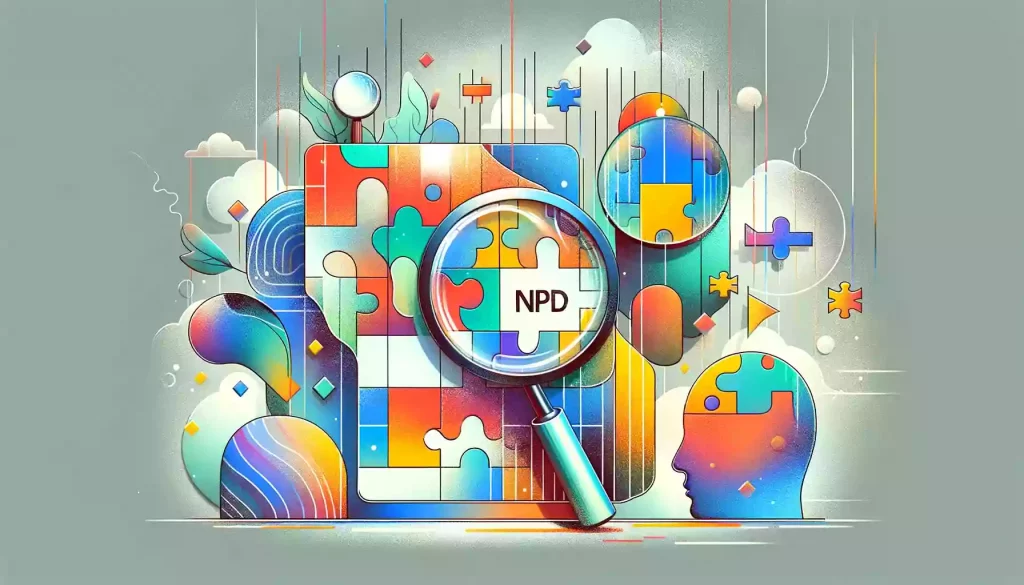Key Takeaways:
- Identifying key NPD behavioral traits
- Impact of NPD on personal relationships
- Effective communication strategies with NPD
- Therapeutic approaches for NPD management
- Understanding the psychology behind NPD
Understanding NPD Traits
Narcissistic Personality Disorder (NPD) is a complex and often misunderstood condition. It's characterized by an inflated sense of self-importance, a deep need for excessive attention and admiration, troubled relationships, and a lack of empathy for others. Understanding NPD traits is crucial for both individuals who exhibit these traits and those who interact with them.
At the core of NPD is a fragile self-esteem, vulnerable to the slightest criticism. This article aims to shed light on the various facets of NPD traits, offering insights into their origin, manifestation, and impact. It's essential for fostering empathy and effective communication, providing a foundation for healthier relationships and personal growth.
While NPD traits can be challenging to identify and manage, increased awareness and understanding can lead to better strategies for dealing with these behaviors. This introduction serves as a guide to recognizing NPD traits and sets the stage for deeper exploration throughout the article.
We will delve into the psychological underpinnings of NPD, examine its impact on relationships, and offer practical advice for those affected. Whether you're dealing with NPD traits personally or in a loved one, this article offers valuable insights and guidance.
By the end of this article, readers will have a comprehensive understanding of NPD traits, equipped with the knowledge to navigate the complexities of these behaviors in various aspects of life.
The Psychology Behind NPD Traits
The psychology of Narcissistic Personality Disorder is multifaceted, involving a combination of factors that contribute to the development and manifestation of NPD traits. At its core, NPD often stems from a complex interplay between genetic predispositions, environmental influences, and early childhood experiences.
Research suggests that certain genetic factors may predispose individuals to develop NPD traits. However, these traits are often exacerbated by environmental factors such as parenting style, social interactions, and cultural influences. For instance, a child who consistently receives excessive praise or, conversely, excessive criticism may develop an inflated sense of self-importance or a deep need for admiration, hallmark traits of NPD.
Early childhood experiences, particularly those involving trauma or neglect, play a significant role in the development of NPD traits. Such experiences can lead to a distorted self-image and affect the ability to form healthy relationships. The protective shell of narcissism may develop as a defense mechanism against deep-seated insecurities and vulnerabilities.
Understanding the psychological roots of NPD is crucial for effective treatment and management. Therapeutic approaches often focus on addressing these underlying issues, helping individuals with NPD traits develop healthier self-perceptions and relationship patterns.
This section aims to provide a deeper understanding of the psychological aspects of NPD, offering a foundation for the subsequent discussions on identifying, managing, and coping with NPD traits.
Identifying Common NPD Traits

Recognizing the traits of Narcissistic Personality Disorder (NPD) is crucial for understanding and addressing the condition. NPD traits often involve a pervasive pattern of grandiosity, a constant need for admiration, and a lack of empathy. These traits can manifest in various ways, influencing behavior, thought processes, and interpersonal relationships.
One of the most prominent NPD traits is an exaggerated sense of self-importance. Individuals with NPD may exaggerate achievements and talents, expecting to be recognized as superior without commensurate achievements. This trait is often accompanied by fantasies of unlimited success, power, brilliance, beauty, or ideal love.
Another key trait is the need for excessive admiration. This can manifest as a preoccupation with fantasies of success, power, brilliance, beauty, or the perfect mate. People with NPD often require constant attention and admiration and may become distressed if they feel they are not receiving this.
A lack of empathy is also a defining trait of NPD. Individuals may struggle to recognize or identify with the feelings and needs of others. This lack of empathy can lead to strained relationships and a tendency to exploit others for personal gain.
It's important to note that identifying these traits can be challenging, as people with NPD are often adept at masking their vulnerabilities. Understanding these traits is the first step in managing and treating NPD effectively.
The Impact of NPD Traits on Relationships
The impact of NPD traits on relationships can be profound and complex. These traits often lead to challenges in forming and maintaining healthy interpersonal connections. Understanding the dynamics at play is essential for those in relationships with individuals exhibiting NPD traits.
Relationships with someone who has NPD traits are often characterized by a lack of empathy, which can lead to a one-sided dynamic where the needs of the non-NPD partner are frequently ignored or minimized. This can result in feelings of being undervalued or neglected.
The need for admiration and validation in individuals with NPD can create an environment where the relationship revolves around their desires and needs. This can lead to imbalance and resentment, as the other partner's needs and feelings might be overshadowed.
Additionally, the grandiosity and sense of entitlement inherent in NPD can lead to conflict and tension. Individuals with NPD may expect special treatment and compliance with their expectations, which can be unreasonable or difficult for their partners.
Despite these challenges, understanding and managing NPD traits can lead to healthier relationship dynamics. It requires patience, empathy, and often professional guidance to navigate the complexities involved in relationships impacted by NPD.
Navigating Communication with Someone Exhibiting NPD Traits

Communicating effectively with someone who exhibits Narcissistic Personality Disorder (NPD) traits can be challenging. It requires a strategic approach, understanding, and often a significant amount of patience. The key is to navigate these conversations in a way that maintains respect and boundaries while attempting to understand the perspective of the individual with NPD.
It's important to approach conversations with empathy, acknowledging that NPD traits often stem from deep-seated insecurities. However, this empathy should not come at the expense of one's own emotional well-being. Setting clear boundaries is crucial to prevent manipulation or emotional exploitation.
Individuals with NPD may have difficulty accepting criticism or differing opinions. When discussing sensitive topics, it's beneficial to use a non-confrontational approach and focus on how certain behaviors affect you personally, rather than directly blaming or criticizing.
Effective communication with someone with NPD also involves recognizing and avoiding potential triggers that could escalate the conversation into a conflict. Understanding these triggers requires patience and careful observation over time.
It's also helpful to reinforce positive behaviors and acknowledge improvements or efforts made by the individual with NPD. Positive reinforcement can encourage healthier interaction patterns and reduce the frequency of challenging behaviors.
In some cases, it may be necessary to seek professional guidance to facilitate better communication. Therapists or counselors experienced in dealing with NPD can provide valuable insights and strategies.
Ultimately, maintaining a balance between empathy for the individual with NPD and self-care is vital. Navigating these conversations can be complex, but with the right approach, it is possible to establish a more harmonious communication dynamic.
Coping Strategies for Those Affected by NPD Traits
Living with or being close to someone who exhibits NPD traits can be emotionally taxing. Developing coping strategies is essential for maintaining one's mental and emotional well-being. The following paragraphs offer practical advice for those affected by NPD traits in a loved one or acquaintance.
One of the primary coping strategies is setting boundaries. This involves clearly defining what is acceptable and what is not in your interactions with the individual. Boundaries help in protecting your emotional space and preventing manipulation.
Another vital strategy is seeking support. This can come from friends, family, support groups, or professional therapists. Sharing your experiences and receiving guidance can provide the emotional strength and strategies needed to cope with the challenges.
Lastly, practicing self-care is crucial. Engaging in activities that promote your well-being, like exercise, hobbies, or meditation, can help maintain your emotional equilibrium and resilience in the face of the challenges posed by NPD traits.
Professional Approaches to Managing NPD Traits

Professional intervention can be crucial in managing Narcissistic Personality Disorder (NPD) traits effectively. There are several therapeutic approaches that mental health professionals may employ, each focusing on different aspects of NPD. These treatments aim to help individuals understand and manage their traits, improving their relationships and overall quality of life.
One common approach is psychotherapy, particularly cognitive-behavioral therapy (CBT). CBT helps individuals recognize and change harmful thought patterns and behaviors. For those with NPD, it can be particularly effective in addressing issues like lack of empathy, entitlement, and relationship challenges.
Another therapeutic approach is psychodynamic therapy, which delves into the unconscious mind to uncover underlying motivations and early life experiences that may contribute to NPD traits. This therapy aims to bring a deeper level of self-awareness and understanding.
Group therapy can also be beneficial, offering a safe space for individuals with NPD to interact with others facing similar challenges. It provides an opportunity for learning and practicing new social skills and empathy in a controlled environment.
In some cases, medication may be prescribed to manage symptoms associated with NPD, such as depression or anxiety. While there are no specific medications for NPD, these treatments can help alleviate co-occurring symptoms, making therapy more effective.
Family therapy is another important aspect, especially when NPD traits significantly impact family dynamics. This approach helps family members understand the disorder and develop healthier ways of interacting.
Lastly, lifestyle modifications and self-help strategies can complement professional treatment. Regular exercise, mindfulness practices, and a healthy diet can improve overall well-being and resilience, aiding in the management of NPD traits.
Personal Stories: Living with NPD Traits
Understanding the real-life implications of Narcissistic Personality Disorder (NPD) traits can be best illuminated through personal stories. These narratives provide insight into the challenges, triumphs, and journeys of those living with or affected by NPD.
One story might involve an individual who struggled with the grandiosity and entitlement characteristic of NPD. Through therapy and self-reflection, they learned to recognize the impact of their behavior on others and began the process of change.
Another narrative could focus on a partner of someone with NPD traits. This story might explore the emotional rollercoaster of such a relationship, the challenges faced, and the strategies employed to maintain a sense of self and emotional well-being.
A third story might come from a family member, detailing the dynamics within a family affected by NPD. It could highlight the difficulties in maintaining healthy boundaries and the journey towards understanding and empathy.
These personal stories serve to humanize the experience of living with NPD traits, offering hope and understanding to those who may be facing similar challenges. They underscore the importance of support, patience, and professional help in navigating life with NPD.
The Role of Therapy in Addressing NPD Traits
Therapy plays a pivotal role in addressing Narcissistic Personality Disorder (NPD) traits. It provides a structured environment where individuals can explore the root causes of their behaviors and learn strategies to manage them. This section delves into the various therapeutic modalities and their effectiveness in treating NPD traits.
Cognitive-behavioral therapy (CBT) is often a cornerstone in treating NPD. CBT helps individuals identify and change destructive thought patterns and behaviors. Through this therapy, individuals with NPD can learn to recognize their unrealistic self-perceptions and expectations, and develop healthier ways of relating to others.
Dialectical behavior therapy (DBT) can also be beneficial. DBT focuses on building skills in distress tolerance, emotional regulation, mindfulness, and interpersonal effectiveness. These skills are particularly useful for individuals with NPD in managing their emotional responses and improving their relationships.
Psychodynamic therapy offers a deeper exploration into the unconscious factors contributing to NPD traits. It can help uncover past traumas or experiences that may be driving the narcissistic behaviors, providing insight and pathways for change.
Group therapy presents a unique opportunity for individuals with NPD to interact with others in a safe, therapeutic setting. It encourages empathy, social learning, and provides a platform for practicing new behaviors.
The integration of therapy into the treatment plan for NPD is vital. It offers hope and a pathway to a more self-aware, empathetic, and fulfilling life for those struggling with NPD traits.
Preventing the Escalation of NPD Traits
Preventing the escalation of NPD traits is crucial for the well-being of both individuals with the disorder and those around them. Early recognition and intervention can make a significant difference in managing these traits. This section outlines strategies and measures to prevent the worsening of NPD traits.
Awareness and education are key in early detection. Understanding the signs and symptoms of NPD can help in recognizing the disorder before it becomes deeply ingrained. Education about NPD should be widespread, extending to schools, workplaces, and health care settings.
Encouraging healthy emotional development from a young age is essential. This involves nurturing empathy, fostering secure attachments, and teaching effective communication skills. These foundations can help mitigate the development of narcissistic traits.
Regular mental health check-ups can also play a role in early detection. Just as physical health is regularly monitored, mental health should be given equal importance, with regular assessments that could identify emerging NPD traits.
Creating supportive and understanding environments is vital. Whether in families, schools, or workplaces, environments that promote open communication, respect, and empathy can discourage the development of NPD traits.
Lastly, accessible and effective mental health services are crucial for those showing early signs of NPD. Timely intervention with appropriate therapeutic approaches can prevent the escalation of these traits, leading to better outcomes for individuals and their communities.
FAQ: Common Questions About NPD Traits
This section addresses frequently asked questions about Narcissistic Personality Disorder (NPD) traits, providing clear and concise answers to help readers deepen their understanding of the disorder. These questions cover a range of topics from identification to management of NPD traits.
Q1: What are the main signs of NPD? A: Key signs include an inflated sense of self-importance, a constant need for admiration, lack of empathy, and often envy towards others or a belief that others are envious of them.
Q2: Can NPD be cured? A: While there's no cure for NPD, symptoms can be managed with therapy. Long-term treatment can lead to significant improvements in the quality of life and relationships.
Q3: How does NPD affect relationships? A: NPD traits can lead to challenging dynamics, such as lack of empathy, manipulation, and a one-sided focus on the needs of the person with NPD, often causing strain in relationships.
Q4: Is NPD linked to childhood experiences? A: Yes, NPD traits can be linked to early childhood experiences such as neglect, excessive pampering, or unrealistic expectations from parents.
Q5: Can someone with NPD have successful relationships? A: Yes, with awareness, therapy, and effort, individuals with NPD can develop healthier relationship patterns and have successful relationships.
Conclusion: Embracing a Balanced Perspective on NPD Traits
Understanding and managing Narcissistic Personality Disorder (NPD) traits is a multifaceted process. This article has explored the various aspects of NPD, from its psychological underpinnings to its impact on relationships and strategies for managing it.
It's important to remember that NPD, like any other mental health condition, requires empathy and understanding. Stigmatizing or oversimplifying the disorder does a disservice to those who struggle with it and those around them.
Therapy and professional guidance play a crucial role in managing NPD traits. With the right support, individuals with NPD can lead fulfilling lives and maintain healthy relationships.
For those affected by someone with NPD traits, self-care, setting boundaries, and seeking support are vital. Remember, you are not alone, and resources are available to help navigate these challenges.
Embracing a balanced perspective on NPD is essential. This means recognizing the complexities of the disorder, the potential for change, and the importance of compassion in dealing with NPD traits.
Recommended Resources
- The Narcissism Epidemic: Living in the Age of Entitlement by Jean M. Twenge and W. Keith Campbell, Free Press, 2009
- Disarming the Narcissist: Surviving and Thriving with the Self-Absorbed by Wendy T. Behary, New Harbinger Publications, 2013
- Will I Ever Be Good Enough? Healing the Daughters of Narcissistic Mothers by Karyl McBride, Atria Books, 2008





Recommended Comments
There are no comments to display.
Create an account or sign in to comment
You need to be a member in order to leave a comment
Create an account
Sign up for a new account in our community. It's easy!
Register a new accountSign in
Already have an account? Sign in here.
Sign In Now